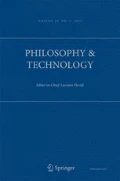Abstract
Sparrow (J Appl Philos 24:62–77, 2007) argues that military robots capable of making their own decisions would be independent enough to allow us denial for their actions, yet too unlike us to be the targets of meaningful blame or praise—thereby fostering what Matthias (Ethics Inf Technol 6:175–183, 2004) has dubbed “the responsibility gap.” We agree with Sparrow that someone must be held responsible for all actions taken in a military conflict. That said, we think Sparrow overlooks the possibility of what we term “blank check” responsibility: A person of sufficiently high standing could accept responsibility for the actions of autonomous robotic devices—even if that person could not be causally linked to those actions besides this prior agreement. The basic intuition behind our proposal is that humans can impute relations even when no other form of contact can be established. The missed alternative we want to highlight, then, would consist in an exchange: Social prestige in the occupation of a given office would come at the price of signing away part of one's freedoms to a contingent and unpredictable future guided by another (in this case, artificial) agency.
Similar content being viewed by others
References
Arkin, R. C. (2009). Governing lethal behavior in autonomous robots. Boca Raton: Chapman and Hall.
Arkin, R.C., Ulam, P. (2009). An ethical adaptor: behavioral modification derived from moral emotions. Technical Report GIT-GVU-09-04, Georgia Institute of Technology, Atlanta
Asaro, P. M. (2008). How just could a robot war be? In A. Briggle, K. Waelbers, & P. Brey (Eds.), Current issues in computing and philosophy (pp. 50–64). Amsterdam: Ios Press.
Champagne, M. (2011). Axiomatizing umwelt normativity. Sign Systems Studies, 39(1), 9–59.
Krishnan, A. (2009). Killer robots: legality and ethicality of autonomous weapons. Farnham: Ashgate.
Lin, P., Bekey, G.A., Abney, K. (2008). Autonomous military robotics: risk, ethics, and design. Report for the US Department of Defense/Office of Naval Research
Lokhorst, G.-J., & van den Hoven, J. (2012). Responsibility for military robots. In P. Lin, G. A. Bekey, & K. Abney (Eds.), Robot ethics: the ethical and social implications of robotics (pp. 145–156). Cambridge: MIT Press.
Matthias, A. (2004). The responsibility gap. Ethics and Information Technology, 6(3), 175–183.
McMahan, J. (2009). Killing in war. Oxford: Oxford University Press.
Petersen, S. (2012). Designing people to serve. In P. Lin, G. A. Bekey, & K. Abney (Eds.), Robot ethics: the ethical and social implications of robotics (pp. 283–298). Cambridge: MIT Press.
Singer, P. W. (2010). Wired for war: the robotics revolution and conflict in the 21st century. New York: Penguin.
Sparrow, R. (2007). Killer robots. Journal of Applied Philosophy, 24(1), 62–77.
Sullins, J. P. (2010). RoboWarfare: can robots be more ethical than humans on the battlefield? Ethics and Information Technology, 12(3), 263–275.
Tonkens, R. (2012). Out of character: on the creation of virtuous machines. Ethics and Information Technology, 14(2), 137–149.
Ullmann-Margalit, E., & Morgenbesser, S. (1977). Picking and choosing. Social Research, 44(4), 757–785.
Velleman, J. D. (1992). Against the right to die. The Journal of Medicine and Philosophy, 17(6), 665–681.
Walzer, M. (1977). Just and unjust wars: a moral argument with historical illustrations. New York: Basic.
Acknowledgments
We would like to thank Mohammad Al-Hakim, Robert Myers, Joanna Bryson, David Gunkel, Luciano Floridi, and Alberto Richards, participants at the 2012 joint meeting of the International Association of Computing and Philosophy and the Society for the Study of Artificial Intelligence and the Simulation of Behaviour, as well as four anonymous reviewers for this journal. We would also like to acknowledge the support of York University's Department of Philosophy.
Author information
Authors and Affiliations
Corresponding author
Rights and permissions
About this article
Cite this article
Champagne, M., Tonkens, R. Bridging the Responsibility Gap in Automated Warfare. Philos. Technol. 28, 125–137 (2015). https://doi.org/10.1007/s13347-013-0138-3
Received:
Accepted:
Published:
Issue Date:
DOI: https://doi.org/10.1007/s13347-013-0138-3




